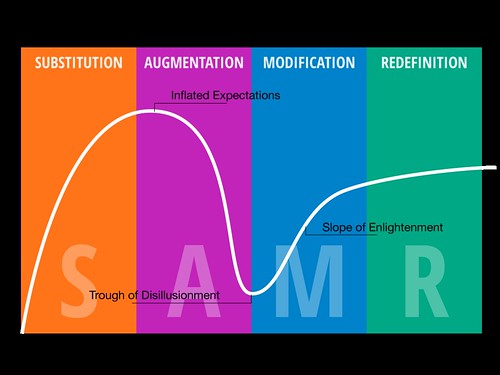This is an odd post because Democratic education is not a topic I usually address in my blog. Well, at least not directly and intentionally. I have some of my best ideas emerge during the summer. Summer for me is a time of concentrated teaching. I spend full days teaching, and something about that focus on two teaching projects at once seems to focus my mind and generate surprising new directions. Two years ago it was the time
Tech EDGE idea was born.
This summer I woke up one morning and thought: I wonder what a democratic teacher education would look like? I posed the question throughout that day and found that it resonated with two graduate students. Now, I am quite center that the same two students are probably the reason I asked myself the question in the first place. Our conversations during the intensive weeks in class help direct my thinking and allow me to wonder.
Fast forward 3 months and we now have a troika exploring democratic teacher education embedded within a teacher education program that focuses on pedagogical content knowledge. So my task here (homework assigned by graduate students really) is to try and explore in writing what Democratic education means to me.
On that morning I first consciously thought about democratic education I walked around and asked anyone I can. What would it even look like? I found the idea tantalizing but far from fully formed. To me democratic education has three main features: participation, tolerance, and process. This view has emerged after some discussions and additional thinking I've been doing. It is not an attempt at an objective definition it is what it means to me.
It starts with participation. Show up, use your voice, work with others. Democracy for me is about using your voice on topics you know and care about. It is not part of an agenda define by others but instead guided but a set of principles you work out for yourself overtime. It starts with showing up, if you do not show up nothing else will happen, tacit voting does not replace engagement. Using your voice is a balancing act. I know people who use their voice because they have it and frankly like to use it more than they actually like thinking through issues. For me the heart of using your voice is actually about understanding the problem first, the complexities involved the risks and opportunities. Finally its the ability to work with others, more precisely others who may not agree with you about everything. I HATE debate, the way it plays out in American schools and congress, it is not an effort to reach compromise or listen. Instead it a battle with points winners and losers, teaching that it is all about who comes on top and not what we can accomplish together, but I digress.

Tolerance has to be a key principle in any democratic endeavor. When defining what democratic processes are, there must be ways to protect divergent views from being squashed by fear of social or grade pressures. This has always been a struggle for me. How to get an honest discussion in class when I am the all powerful instructor (read: grade giver), professional authority (education and experience). I also have a strong voice and am a male teaching mostly female students in a genderized (my dictionary says it is not a word, is it not?) profession. The completely unsatisfactory solution (like democracy itself?) is on creating a community in the classroom. Creating familiarity that can increase students' level of comfort (and mine) to reduce the power relationship so central to higher education.
Process for me is the how. This is probably where most of my work must be. How to create procedures and actions that will create a more democratic milieu. The paradox of course is that I cannot fully define such process, because if I do it becomes inherently undemocratic.
This is it for now, welcoming all democratic ideas...








